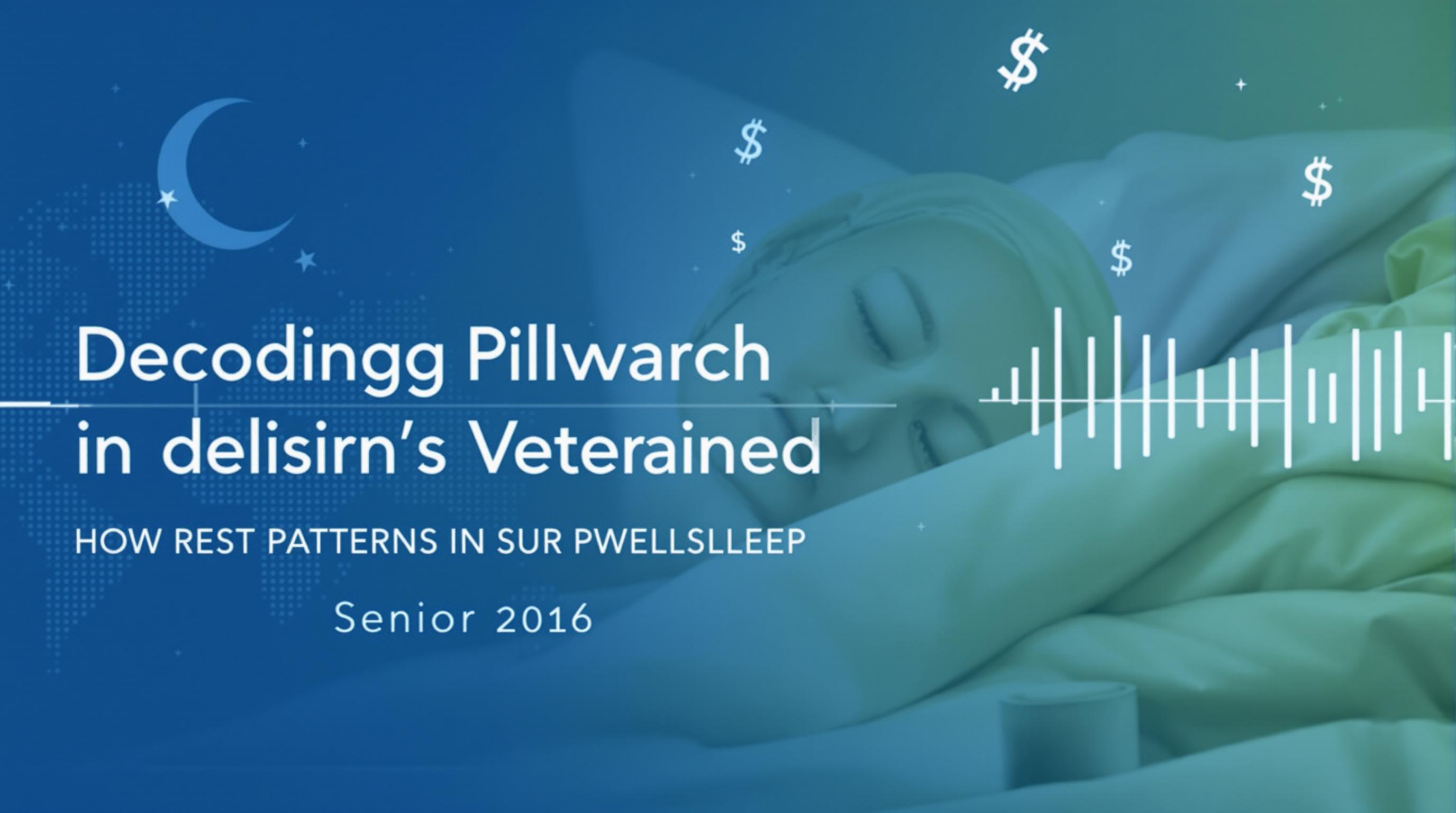Related Articles
- Top 6 Quantitative Hedge Funds Launched Since 2019 That Challenge Traditional Diversification Models
- Top 8 Cutting-Edge Retirement Income Vehicles From the Last Five Years Revolutionizing Financial Freedom
- Uncovering the Role of Behavioral Biases in Roth Conversion Decisions and Their Impact on Long-Term Wealth
- Top 6 Revolutionary Dividend Reinvestment Platforms Launched Since 2019 Redefining Passive Income Growth
- Top 7 Breakthrough Retirement Income Platforms Launched in the Last Five Years Compared and Ranked
- The Untold Influence of Cultural Artifacts on Expanding Investment Horizons and Mitigating Financial Risks
Decoding Sleep Patterns in Senior Years: How Rest Quality Impacts Later-Life Financial Decisions and Wellbeing
Decoding Sleep Patterns in Senior Years: How Rest Quality Impacts Later-Life Financial Decisions and Wellbeing
Sleep is more than just a nightly ritual; it profoundly influences how seniors manage their financial decisions and overall wellbeing. Exploring the intersection between sleep patterns in older adults and their life quality reveals impactful insights for individuals and families alike.
Sleeping Your Way to Better Decisions: More Than Just Rest
Imagine this: you’re 68 years old, facing choices about retirement savings and healthcare expenses, but nights are restless, filled with tossing and turning. According to the National Sleep Foundation, nearly 44% of seniors report having sleep issues, such as insomnia or fragmented sleep. This chronic lack of quality sleep doesn’t just sap energy — it directly impairs cognitive functions critical for sound financial planning. In fact, poor sleep can reduce decision-making accuracy by up to 30% (Walker, 2017), leading seniors to impulsively spend, mismanage bills, or avoid necessary financial planning altogether.
Case Study: Mrs. Thompson’s Story
Mrs. Thompson, 70, used to be meticulous about her budget and savings. However, after she began suffering from untreated sleep apnea, her ability to concentrate faltered. Simple tasks like comparing health insurance plans or calculating monthly expenses became overwhelming. After receiving treatment to improve her sleep quality, she regained confidence in managing her finances, demonstrating the tangible link between rest and daily function.
The Science Behind Sleep and Brain Function
During restorative sleep, the brain consolidates memories, regulates emotional responses, and enables logical reasoning — all essential for making complex decisions. Studies utilizing functional MRI scans reveal that sleep deprivation dampens activity in the prefrontal cortex, the brain’s hotspot for executive function. For seniors, whose neurological resilience is already challenged by aging, maintaining quality sleep is *crucial* for preserving cognitive sharpness.
Financial Fragility Meets Fatigue
Confused by conflicting financial advice, seniors sometimes fall prey to scams or poor investment decisions. A 2019 survey by the FINRA Investor Education Foundation found that older adults who reported frequent sleep disturbances were 2.5 times more likely to exhibit poor financial literacy. Can you imagine how easily a tired mind could misread fine print or overlook important fees?
This isn’t just a sleepy warning; it’s a wake-up call. Understanding the role of sleep can empower caregivers and clinicians to support older adults more holistically, integrating rest hygiene into financial counseling.
Conversational Insight: What Your Grandpa’s Sleep Might Be Telling You
“You know,” my grandfather once said, “I never thought my broken nights could mess with my wallet.” He’s 72 now, and after battling chronic insomnia, he noticed himself making odd purchases and forgetting bills. A friend recommended a sleep therapist, and suddenly he’s back to balancing his checkbook like a pro. It’s funny how sometimes, the best financial advisor can be a good night’s sleep.
The Ripple Effect on Wellbeing
When sleep is neglected, it’s not just bank accounts at risk. Poor sleep influences physical health by increasing risks for hypertension, diabetes, and depression, all of which carry financial burdens. The CDC estimates that chronic sleep deprivation results in over $400 billion in lost productivity and healthcare costs annually in the U.S. (CDC, 2021). For seniors, this financial drain compounds the stress of aging, decreasing quality of life across the board.
Practical Tips: Enhancing Sleep to Boost Financial Wellbeing
So, what can aging adults and their families do?
- Prioritize Sleep Hygiene: Create a restful environment—dark, quiet, and cool.
- Seek Medical Advice: Conditions like sleep apnea and restless leg syndrome are treatable.
- Manage Stress: Mindfulness and relaxation techniques can mitigate insomnia.
- Integrate Financial Planning with Health Checks: Encourage cross-disciplinary conversations between financial advisors and healthcare providers.
Technology’s Role: Gadgets as Sleep Aids?
From white noise machines to wearable sleep trackers, technology offers promising tools to monitor and improve sleep quality. Wearing devices that measure heart rate variability and sleep stages can alert seniors when rest is insufficient, prompting timely interventions. That said, technology isn’t a cure-all — proper lifestyle habits remain foundational.
Let’s Talk Numbers (Because Who Doesn’t Love Them?)
Research published in the Journal of Gerontology (2020) demonstrated that seniors averaging less than six hours of sleep scored 25% worse on financial literacy assessments than those who got seven or more hours. It’s clear that catching those extra zzz’s isn’t just about feeling good; it’s directly linked to mental acuity that handles the household budget.
A Holistic View: Sleep as a Cornerstone of Aging Gracefully
Looking beyond mere numbers, good sleep facilitates emotional wellbeing and social engagement. Seniors who sleep well report higher levels of satisfaction and reduced anxiety, factors that indirectly promote healthier spending and investment habits. When the mind is calm and rested, it combats fears around money scarcity and fosters proactive planning rather than reactive panic.
As a 34-year-old aspiring writer familiar with the narratives of my aging relatives, I see a profoundly interconnected web: sleep quality knits together brain health, mood regulation, and financial decision-making. For readers aged 16 to 70, this message is vital now — because cultivating good sleep habits early lays the foundation for a future where your golden years aren’t clouded by fatigue-fueled mistakes.
Final Call to Action
If you’re caring for elders or approaching senior age yourself, consider sleep assessment as essential a checkup as blood pressure. Advocate for research-backed sleep interventions as part of retirement and health planning. Because in the end, a well-rested mind just might be the most valuable asset a senior has.
References:
- National Sleep Foundation, Sleep in Older Adults, 2020
- Walker, M. P. (2017). Why We Sleep: Unlocking the Power of Sleep and Dreams. Scribner.
- CDC, Sleep and Health, 2021
- FINRA Investor Education Foundation, Financial Capability in the United States, 2019
- Journal of Gerontology, Sleep and Cognitive Function in Seniors, 2020




